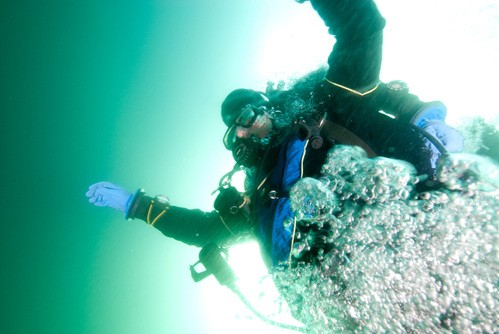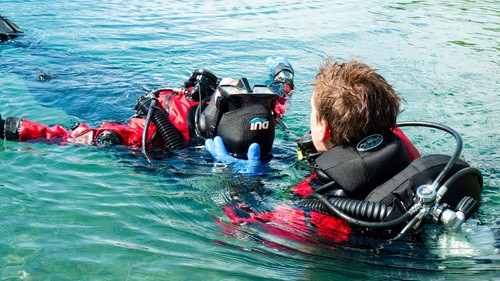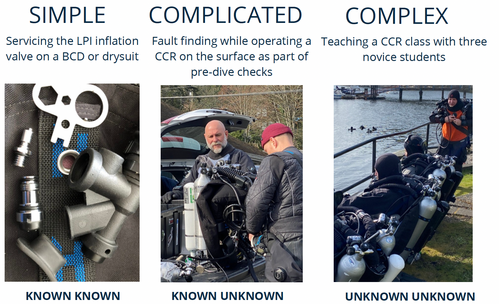Delving into Learning from Unintended Outcomes

The Human Diver’s Comprehensive Learning Review Guide
Text BY GARETH LOCK
In the aftermath of diving incidents, the diving community often finds itself ensnared in a whirlpool of blame, diverting attention from the pressing need to learn from these tragic events. A reflective blog by The Human Diver provides poignant commentary on this issue, centred around the unfortunate demise of a diver. While the standard response is to wait for official investigations, these are frequently focused on identifying culpability rather than facilitating understanding and growth. The "Learning Review Guide in Diving" from The Human Diver disrupts this status quo, encouraging a shift towards a sense-making, not blame-focused, evaluation of events.
Emphasising Human Factors in Diving
For years, The Human Diver has been at the forefront of integrating human factors into diving safety, drawing on lessons from high-risk domains like aviation and healthcare. Despite some scepticism, the criticality of these factors in diving is unequivocal. Industry challenges for learning from incidents include a lack of a cohesive incident reporting mechanism and a myriad of definitions for what constitutes an incident, muddying the waters for clear learning outcomes. Drawing inspiration from Dr Ivan Pupulidy's innovative approaches within the US Forest Service, the guide seeks to decode the motivations and decisions of divers and supervisors/instructors within the complexity of diving activities.
The Guide
The guide addresses a spectrum of diving professionals—from commercial and military divers to those in media and academia—acknowledging the diverse organisational context in which they operate. The goal of the guide is to move ‘up and out’ and not ‘down and in’, where it is easy to blame. While designed for the diving industry, the guide's foundational principles have relevance across a range of complex operational systems.
"The Learning Review Guide" is split into two parts: essential concepts for organising reviews and a toolkit with additional resources and references to build divers and practitioners knowledge. “The Human Diver” also offers more in-depth courses to cater to those who prefer a hands-on learning experience.
Simple. Complicated. Complex. The differences are important when it comes to learning.
Classified by safety science, systems range from simple to complicated and complex. Diving incidents predominantly occur within complex systems, where a mesh of interrelated elements complicates tracing cause and effect. Acknowledging the complexity of the system in which an incident occurs is crucial for suitable and efficacious prevention strategies. Recent insights from The Human Diver advocate for a move beyond singular learning loops to embrace double- and triple-loop learning, fostering systemic change and shifting the focus away from individual blame.
Learning Reviews represent a paradigm shift from conventional investigations by prioritising understanding and learning rather than just focusing on compliance or non-compliance. Recognising that errors occur across all levels,
Text BY GARETH LOCK
In the aftermath of diving incidents, the diving community often finds itself ensnared in a whirlpool of blame, diverting attention from the pressing need to learn from these tragic events. A reflective blog by The Human Diver provides poignant commentary on this issue, centred around the unfortunate demise of a diver. While the standard response is to wait for official investigations, these are frequently focused on identifying culpability rather than facilitating understanding and growth. The "Learning Review Guide in Diving" from The Human Diver disrupts this status quo, encouraging a shift towards a sense-making, not blame-focused, evaluation of events.
Emphasising Human Factors in Diving
For years, The Human Diver has been at the forefront of integrating human factors into diving safety, drawing on lessons from high-risk domains like aviation and healthcare. Despite some scepticism, the criticality of these factors in diving is unequivocal. Industry challenges for learning from incidents include a lack of a cohesive incident reporting mechanism and a myriad of definitions for what constitutes an incident, muddying the waters for clear learning outcomes. Drawing inspiration from Dr Ivan Pupulidy's innovative approaches within the US Forest Service, the guide seeks to decode the motivations and decisions of divers and supervisors/instructors within the complexity of diving activities.
The Guide
The guide addresses a spectrum of diving professionals—from commercial and military divers to those in media and academia—acknowledging the diverse organisational context in which they operate. The goal of the guide is to move ‘up and out’ and not ‘down and in’, where it is easy to blame. While designed for the diving industry, the guide's foundational principles have relevance across a range of complex operational systems.
"The Learning Review Guide" is split into two parts: essential concepts for organising reviews and a toolkit with additional resources and references to build divers and practitioners knowledge. “The Human Diver” also offers more in-depth courses to cater to those who prefer a hands-on learning experience.
Simple. Complicated. Complex. The differences are important when it comes to learning.
Classified by safety science, systems range from simple to complicated and complex. Diving incidents predominantly occur within complex systems, where a mesh of interrelated elements complicates tracing cause and effect. Acknowledging the complexity of the system in which an incident occurs is crucial for suitable and efficacious prevention strategies. Recent insights from The Human Diver advocate for a move beyond singular learning loops to embrace double- and triple-loop learning, fostering systemic change and shifting the focus away from individual blame.
Learning Reviews represent a paradigm shift from conventional investigations by prioritising understanding and learning rather than just focusing on compliance or non-compliance. Recognising that errors occur across all levels,

Learning Reviews advocate for an all-encompassing perspective, probing the contextual and systemic factors that influence decisions. This approach equips diving teams to establish stronger safety systems, enhancing the capacity to learn from the entire context surrounding an incident, not just the specific behaviours of those directly involved.
The Mechanics of Conducting a Learning Review
Commencing with detailed information collection by gathering and exploring narratives from multiple stakeholders to construct a comprehensive account, Learning Reviews utilise a Network Influence Map as a tool to represent the interaction and interdependence of influential factors, aiding in identifying themes and conveying the complexity of events.
Subsequently, expert analysis seeks to highlight where similar risks may reside within the wider diving system and explores potential mitigation strategies. This phase of analysis moves away from the particulars of an incident, widening the lens to consider 'normal' diving operations. A key element of the guide is the emphasis on comprehending the "local rationality" of individuals—how their decisions made sense given their circumstances, objectives, and available resources.
The conclusion of a Learning Review process is the generation of bespoke Learning Products, designed to address the specific needs of various stakeholders within the diving ecosystem, ranging from field divers to instructors and organisational leaders. Generic reports are deemed insufficient; nuanced and actionable learning is the objective to ensure meaningful dissemination of knowledge.
The Mechanics of Conducting a Learning Review
Commencing with detailed information collection by gathering and exploring narratives from multiple stakeholders to construct a comprehensive account, Learning Reviews utilise a Network Influence Map as a tool to represent the interaction and interdependence of influential factors, aiding in identifying themes and conveying the complexity of events.
Subsequently, expert analysis seeks to highlight where similar risks may reside within the wider diving system and explores potential mitigation strategies. This phase of analysis moves away from the particulars of an incident, widening the lens to consider 'normal' diving operations. A key element of the guide is the emphasis on comprehending the "local rationality" of individuals—how their decisions made sense given their circumstances, objectives, and available resources.
The conclusion of a Learning Review process is the generation of bespoke Learning Products, designed to address the specific needs of various stakeholders within the diving ecosystem, ranging from field divers to instructors and organisational leaders. Generic reports are deemed insufficient; nuanced and actionable learning is the objective to ensure meaningful dissemination of knowledge.

Summary
The captivating call of the undersea world is not without its inherent dangers. Although safety may not always be the foremost priority due to finite resources (despite what some might say), safety is undeniably a significant aspect of diving operations. The Human Diver's guide serves as a proactive tool for reflection and learning from past incidents, presenting a systematic and constructive framework. Placing a systems-oriented thought process at its core and contending with the multifaceted nature of diving incidents, the guide heralds a new era of learning from unintended outcomes and events. This innovative methodology enables divers and their organisations to assimilate historical lessons and chart a course toward a more secure and informed future under the surface.
The 24-page Learning Review Guide for Diving can be downloaded for free from here https://www.thehumandiver.com/lr-diving
The captivating call of the undersea world is not without its inherent dangers. Although safety may not always be the foremost priority due to finite resources (despite what some might say), safety is undeniably a significant aspect of diving operations. The Human Diver's guide serves as a proactive tool for reflection and learning from past incidents, presenting a systematic and constructive framework. Placing a systems-oriented thought process at its core and contending with the multifaceted nature of diving incidents, the guide heralds a new era of learning from unintended outcomes and events. This innovative methodology enables divers and their organisations to assimilate historical lessons and chart a course toward a more secure and informed future under the surface.
The 24-page Learning Review Guide for Diving can be downloaded for free from here https://www.thehumandiver.com/lr-diving
Categories
2025
2024
February
March
April
May
October
My name is Rosanne… DAN was there for me?My name is Pam… DAN was there for me?My name is Nadia… DAN was there for me?My name is Morgan… DAN was there for me?My name is Mark… DAN was there for me?My name is Julika… DAN was there for me?My name is James Lewis… DAN was there for me?My name is Jack… DAN was there for me?My name is Mrs. Du Toit… DAN was there for me?My name is Sean… DAN was there for me?My name is Clayton… DAN was there for me?My name is Claire… DAN was there for me?My name is Lauren… DAN was there for me?My name is Amos… DAN was there for me?My name is Kelly… DAN was there for me?Get to Know DAN Instructor: Mauro JijeGet to know DAN Instructor: Sinda da GraçaGet to know DAN Instructor: JP BarnardGet to know DAN instructor: Gregory DriesselGet to know DAN instructor Trainer: Christo van JaarsveldGet to Know DAN Instructor: Beto Vambiane
November
Get to know DAN Instructor: Dylan BowlesGet to know DAN instructor: Ryan CapazorioGet to know DAN Instructor: Tyrone LubbeGet to know DAN Instructor: Caitlyn MonahanScience Saves SharksSafety AngelsDiving Anilao with Adam SokolskiUnderstanding Dive Equipment RegulationsDiving With A PFOUnderwater NavigationFinding My PassionDiving Deep with DSLRDebunking Freediving MythsImmersion Pulmonary OedemaSwimmer's EarMEMBER PROFILE: RAY DALIOAdventure Auntie: Yvette OosthuizenClean Our OceansWhat to Look for in a Dive Boat
2023
January
March
Terrific Freedive ModeKaboom!....The Big Oxygen Safety IssueScuba Nudi ClothingThe Benefits of Being BaldDive into Freedive InstructionCape Marine Research and Diver DevelopmentThe Inhaca Ocean Alliance.“LIGHTS, Film, Action!”Demo DiversSpecial Forces DiverWhat Dive Computers Don\'t Know | PART 2Toughing It Out Is Dangerous
April
